Content warning: sexual assault // Stealthing, the nonconsensual removal of a sexual barrier, is a type of sexual assault. Learn more about this practice, and what you can do about it.
Stealthing refers to nonconsensual barrier removal during sex. A “barrier” is defined here as any type of physical barrier used to prevent pregnancy and the spread of STIs. This includes condoms, diaphragms, cervical caps and more. When someone consents to sex with the use of a barrier, and that barrier is then removed without the consent or knowledge of everybody involved, this is called stealthing.
Stealthing can take place in any sexual encounter, regardless of the sex or gender of the individuals involved. It can happen in the course of vaginal sex, oral sex, anal sex, scissoring and more. The nonconsensual removal or purposeful shifting of a dental dam is considered stealthing just as much as the nonconsensual removal of a condom. Simply put, if the barrier is purposefully made to be ineffective, it could be considered stealthing. In fact, the intentional damaging or a barrier before use can also be considered stealthing, like if somebody tears or pokes holes into a diaphragm or condom.
Laws Around Stealing
Stealthing is a type of sexual assault, and it is absolutely not okay. It’s an intentional violation of the right to consent and of bodily autonomy. This is a serious form of sexual violence. Unfortunately, not all US states have made stealthing a criminal act. In 2021, California became the first to criminalize nonconsensual removal of a condom during sex. However, the law is not comprehensive, as it focuses solely on condom removal.
Other countries, including the UK, Germany, Switzerland, Canada and New Zealand, have criminalized stealthing. Each government has its own limited definition of what that entails, which is often focused on heterosexual encounters. At the moment, the laws all focus on condom removal or intentional condom damage. So far, there are no comprehensive laws criminalizing all types of barrier removal or damage.
How To Know if Stealthing Happened

(Foto: CC0 / Pixabay / keresi72)
If you finish having sex and you realize the barrier you had put in place initially is now missing or has been put to the side, you might wonder if you’ve been the victim of stealthing. Still, it can be tricky to determine exactly what happened. If your sexual partner claims the barrier came off by accident, or that they didn’t notice it happening, you can’t know for sure if the barrier removal was intentional or accidental.
Some cases will be clearer than others. For example, if your partner’s condom has come clean off and is set to the side, it’s very unlikely this happened on its own. Other types of barriers may make it more difficult to discern whether stealthing happened or not. The shifting of a dental dam or diaphragm, for example, could easily happen unintentionally. It’s important to remember that both you and your partner are responsible for barriers staying in place: if they noticed that something shifted or came off and didn’t say something, it’s worth questioning that behavior. If barriers shifting or falling off is a common occurence and it leaves you feeling unsafe, talk to your partner(s) about ways you can limit barrier shifting.
In the case of barrier damaging, it’s almost impossible to notice. You would need to test the barrier before throwing it out, in order to see if there are any holes. Put pressure on the barrier or squeeze the sides in order to see if there’s any damage. It is also possible that barriers can burst or tear during sex, so this is one of the hardest forms of stealthing to detect.
Sometimes it is difficult to know with certainty whether stealthing happened. If you feel comfortable, you can simply ask your sexual partner(s) what happened if you are unsure. Address the issue head-on by saying “Did you take the barrier off in the middle of sex?” or “Did the barrier move during sex?” or “I’d like to do a quick test to make sure there’s no holes in the barrier.” If they promise they did not remove or damage the barrier, it’s ultimately up to you whether you believe them or not.
Dealing With Stealthing



(Foto: CC0 / Pixabay / Pexels)
If you believe you’re dealing with stealthing, whether your sexual partner(s) admitted to it or not, trust your gut. If something doesn’t feel right, it’s best to prioritize your mental and physical health. Some partners may be sad or angry if you question whether they removed a barrier, but ultimately you have to decide whether you trust them and feel safe around them. Here are some steps to follow if you suspect you might be the victim of stealthing:
- Remove yourself from the situation for your own safety.
- Use emergency contraception, if applicable. If there is risk of pregnancy, make sure to talk to your doctor or head to the pharmacy immediately for emergency birth control. This can be in the form of the Plan B pill, the ella pill or the copper IUD. Talk to a physician about what is the right method for you.
- Take PEP, if applicable. The antiretroviral PEP can protect your body from HIV exposure if you take it within 72 hours of sex. If you know your sexual partner is HIV positive, or if you are unsure, it may make sense to get on PEP. Talk to your doctor as soon as possible to access this medication. You can also go to your nearest Planned Parenthood or sexual health clinic to talk about PEP.
- Get tested for STIs two weeks after sex. You may have to wait a few months to test for HIV, as it can take up to three months to show up on a test. You can do this at your doctor’s office, Planned Parenthood or your local sexual health clinic.
- Consider filing a report. If you live in an area where what happened to you is a crime, you can consider filing a report and pressing charges. If you are unsure, you can start by going to a doctor’s office and getting a r*pe kit done. This is best done as soon as possible after sex, while there is biological evidence of the act. Remember, taking legal action is completely up to you.
- Take a pregnancy test two weeks after sex, if applicable. If there’s a chance you may be pregnant, make sure to check for this.
- Remember, under no conditions is sexual assault ever your fault, stealthing included. If anybody tries to tell you otherwise, end that conversation immediately and remove yourself from the situation.
- Get support. Being sexually assaulted is often overwhelming and traumatizing. No matter what emotions you’re having, they are normal and they are valid. You can get support for what you’re going through in several ways. If you feel comfortable, talk to your loved ones about what happened. In addition, it’s always a good idea to speak with professionals. You likely have a sexual assault crisis center in your area. There, you can access therapy with trained, specialized counselors. If you are unsure about local offices, you can call The National Sexual Assault Hotline or the National Domestic Violence Hotline for crisis counseling, confidential support and information on medical, legal and counseling resources in your area.
Read more:
- Abortion Access in the US: An Uncertain Future
- How To Deal With Gaslighting: 4 Tips
- Self Care: Learning How to Take Care of Yourself
Important Information regarding Health-related Topics.
** Links to retailers marked with ** or underlined orange are partially partner links: If you buy here, you actively support Utopia.org, because we will receive a small part of the sales proceeds. More info.Do you like this post?






